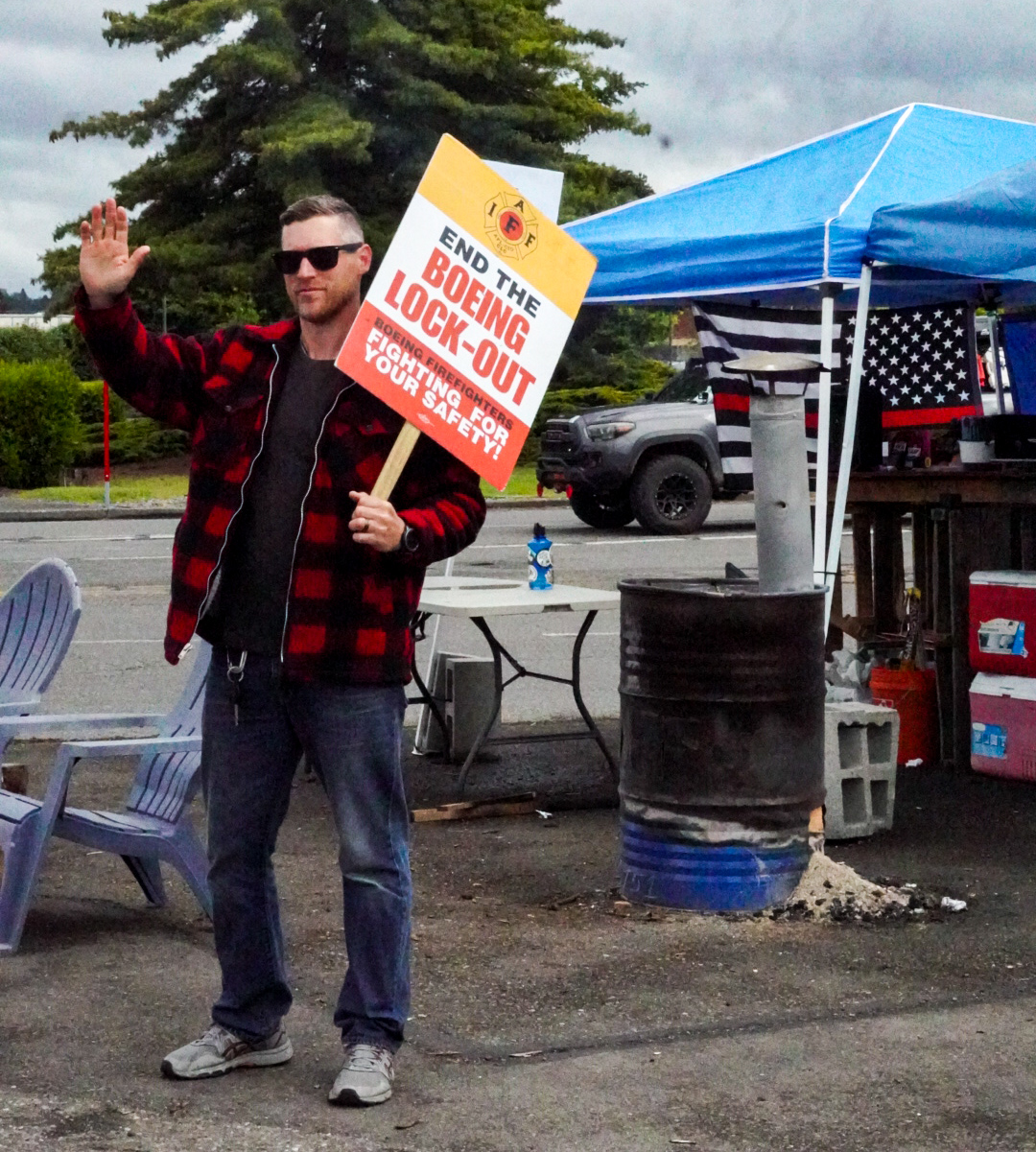Over 100 firefighters and EMS staff working at Boeing facilities in Washington are locked out in an attempt by Boeing to force a contract agreement for low wages and longer progression periods.
At midnight on May 4, Boeing deactivated all security and parking passes of its on-site EMS and firefighters at its six Washington facilities around Seattle.
The lockout began at 12:01 a.m., as the current contract between Boeing and the International Association of Firefighters union expired at midnight, and a new contract had not been agreed upon. The lockout comes after months of failed contract negotiations on wages between the company and the union representing the workers.

Pearl Lwin/THUNDERWORD
Picketing set up at the intersection in front of Boeing, in Auburn, Wash.
Facilities are located in Seattle, Everett, Renton, Auburn, and Moses Lake. 125 firefighters across them all struck up 24/7 pickett lines. They agreed to continue working until a contract was agreed upon, but Boeing is refusing to meet their demands.
The picket lines are receiving much support from locals. Other branches of Boeing employees are being brought into the contract negotiations as structures are shaken up. Union members across the industry are mad at how contracts are divided up and the pressure put on employees to accept.
President Joe Biden recently visited the state, and expressed his support for the firefighters, tweeting, “Collective bargaining is a right that helps employers and employees. I encourage folks to return to the table to secure a deal that benefits Boeing and get these firefighters the pay and benefits they deserve.”
These firefighters are trained to handle airplane take-offs and landing. They respond to medical emergencies and handle specific technology for aircraft manufacturers. The force is knowledgeable in the company’s planes, chemicals, and its massive buildings.
Boeing claimed to have a contingency plan in place to supplement the lost labor force, but so far they have been relying on local firefighters. John Riggsby, a Lt. Boeing Firefighter and vice-president-elect of IAFF Local I-66, spoke to KIRO7. He said, “A response from the county could take [40 minutes] to assemble a hazmat response team.”
Boeing deals out contracts with the space industry and military, as well as commercial airlines for places. Their facilities contain materials for the manufacturing of aircrafts, and their on-site firefighters are the first defense against flame and toxic emissions from dangerous combinations of these materials.
The union is proposing a wage increase of 40% to 50% to bridge the gap between them and local branches. Currently, the starting pay for a qualified air-strip firefighter at Boeing is just $25 an hour. Local and municipal fire departments have an approximate starting wage of $45 an hour.
Studies at the Massachusetts Institute of Technology show that a single adult with no children needs to make at least $30.08 an hour to make a living wage in King County. For adults with a child, the studies reflect a wage of $52.10 to make a living wage.
They are also asking for the progression period to be shortened to five years. It takes 14 years for a Boeing firefighter to reach the top rate of pay for the positions, a feat only a fifth of the force has achieved. Boeing’s contract proposal includes an extension of five years to that period.
Boeing has been in rough skies for a while now, after rushed safety certifications and improper piloting systems lead to plane malfunctions. These malfunctions first caused two fatal plane crashes into the ocean in 2018 and 2019.
Most recently, turbulence and nose dives have resulted in the death of half a dozen passengers. Boeing is subject to investigations by the Federal Aviation Administration (FAA). The company admitted that workers had falsified safety inspection records on 787 planes.
President of the Washington State Labor Council April Sims said, “It’s inconceivable to me [that] Boeing would choose to lock out their firefighters at a time where the whole world is watching their failure to provide safety in the workplace.”
The picket lines are still running around the clock at each facility. They have been joined by thousands of union workers in and out of Boeing, calling for the company to meet their demands and give employees a fair wage. They are accepting all the support they can get, and contract negotiations are still ongoing.

